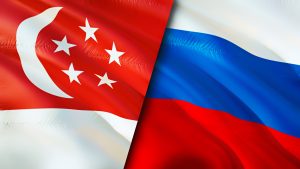Despite being far away from Ukraine, the government of Singapore has not only voiced its condemnation of Russia’s invasion, but has also taken the rare step of imposing unilateral sanctions on the country. According to the Singaporean Ministry of Foreign Affairs, the sanctions will focus on “export controls and blocking of certain financial transactions connected to Russian banks and financial institutions.”
Indeed, Singapore’s move is rare in the sense that all of the sanctions that Singapore authorities currently impose on other states are based on United Nations resolutions. Indeed, the last time that Singapore imposed unilateral sanctions was more than 40 years ago, when Vietnam invaded Cambodia and overthrew the communist Khmer Rouge.
Details of the sanctions have yet to be released, but they will likely focus on export controls and blocking of certain financial transactions connected to Russian banks and financial institutions.
Rare though the move may be, it is not surprising. Singapore’s swift, strong response to the Ukraine-Russia war, especially the imposition of unilateral sanctions on Russia, is consistent with its foreign policy. The decision is rooted in Singapore’s perceived leadership role among small states and its long-time concerns and worries about the survival of such states in the international system. It was triggered by the malfunctioning of existing international institutions. Meanwhile, the relatively remote relationship between Singapore and Russia has also enabled the city-state to be more vocal and brave in its stance than it otherwise might have been.
Boasting only 728 square kilometers of territory, Singapore is one of the smallest nations in the world. Since its independence in 1965, Singapore’s leaders have been well aware of its small size and the vulnerabilities that come with this. Therefore, the rights of small states in world affairs enjoy an official and prominent place in Singapore’s foreign policy. Moreover, being a small and developed state, Singapore has taken it upon itself to represent the world’s small states. In the hope that small states could be given more “strategic weight” in the United Nations, in 1992 Singapore established and has chaired the Forum of Small States, an informal and non-ideological grouping of small nations.
Similarly, in 2009, to address the unfair treatment of small- and medium-sized states by the Organization for Economic Co-operation and Development and to create synergy between the G-20 and the U.N., Singapore set up another informal grouping of 30 small- and medium-sized members of the U.N. known as the Global Governance Group. In addition, Singapore has also participated in two other small-state groupings, the Alliance of Small Island States and the Small Island Developing States.
Another big concern for Singapore is the survival of small states. Of course, survival is a concern for any state, but for small states like Singapore, it is undoubtedly more pressing due to their vulnerabilities and relative lack of strength in the world system. Some are pessimistic about the survival of small states, pointing out that this is primarily determined by the international political environment rather than by the states themselves.
Recognizing the vulnerability of the survival of small states in the world system, Singapore has long advocated for the principles of international law and the U.N. Charter, which underscores the respect for territory integrity and sovereignty. Therefore, Singapore has been consistent in its stand of firmly opposing any kinds of invasions, especially in cases when smaller states have been invaded by bigger powers, such as when Indonesia invaded East Timor and Vietnam, backed by the Soviet Union, invaded Cambodia. As Foreign Minister Vivian Balakrishnan told Parliament last week, “Ukraine is much smaller than Russia, but it is much bigger than Singapore.” By swiftly condemning Russia’s invasion of Ukraine, Singapore does both speaks for itself and acts as a leader and representative of the world’s other small, vulnerable states.
It is not the first time that Singapore has been vocal in condemning Russian actions. In 2014, when Moscow invaded Crimea, Singapore strongly objected, stating that “Russian troops should not be in Ukraine in breach of international law” and that “the sovereignty and territorial integrity of Ukraine must be respected.” Meanwhile, although expecting the U.N. to take steps to stop Russia, Singapore has also realized that the U.N. Security Council (UNSC) may not be able to undertake any meaningful actions for small states like Ukraine given the fact that Russia enjoys a veto as a permanent member of the Council.
Following the invasion, Russia vetoed a UNSC resolution condemning its own actions. The malfunctioning of the U.N., and its inability to safeguard its Charter and the principle of territorial integrity and sovereignty, is clear source of alarm to Singapore. Therefore, to show its responsibility as a leader among small states, Singapore decided to condemn Russia and take the rare step of imposing unilateral sanctions on the country.
Why has Singapore taken a stronger stand against Russia its Southeast Asian neighbors, which has led some to conclude that Singapore is straying away from the Association of Southeast Asian Nations (ASEAN)? Part of the reason is that Singapore is less linked to Russia both economically and militarily. Trade with Russia makes up an insignificant proportion of Singapore’s total trade. It is true that countries in Southeast Asia are major buyers of Russia’s arms, but Singapore is an exception. According to the SIPRI database, the number of arms bought from Russia by Singapore was too small to be listed. On the other hand, Vietnam bought 80 percent of its total imported arms from Russia, Laos 47 percent, Myanmar 40 percent, and Malaysia 26 percent. Therefore, comparing Singapore to the ASEAN member states whose condemnations of Moscow’s actions mentioned neither Russia nor the word “invasion,” such a stance does not come at a price for Singapore. Not only that, the city-state’s brave action stands even to enhance its reputation as a principled member of ASEAN and a leader of the world’s small states.

































